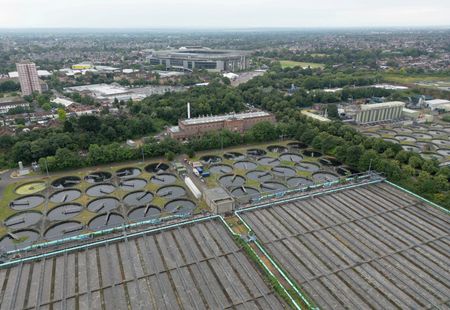By Marc Jones
(Reuters) – Britain’s largest water provider Thames Water suffered a major blow in its battle to avoid renationalisation on Wednesday as credit rating firm Moody’s downgraded its corporate family rating (CFR) and its safest tranche of debt to junk.
The heavily indebted utility is at the centre of a crisis in Britain’s water sector over the amount of sewage being dumped into rivers and seas and crumbling pipe networks.
Moody’s downgraded Thames Water’s CFR to Ba2 – two rungs into ‘junk’ rating territory – from Baa3, which is an investment grade and something water firms are supposed to maintain as part of their licence requirements.
It safest tranche of debt known as senior secured “Class A” bonds were cut to Ba1, which is one notch into junk, while its riskier “Class B” bonds were dumped five notches lower at B3.
Moody’s said the downgrade followed this month’s provisional ruling from British regulator Ofwat that Thames would not be allowed to raise prices as much as it had requested, and because of its “weakening liquidity position”.
In a statement, Thames, which provides water to roughly a quarter of British households and has around 18 billion pounds ($23.25 billion) of debt, said it was still working with Ofwat and seeking new equity funding to shore up its finances.
“Increasing our financial resilience and securing an investible PR24 (price increase) determination is a critical priority for the business,” the company said, adding that it is business as usual in the meantime.
Analysts however are now increasingly convinced the new government will have to step in.
“Almost certainly it will mean special administration for the company,” Seaport credit analyst Satish Pulle said, adding that the downgrade had not come as a surprise.
Special administration is a form of temporary renationalisation.
A spokesperson for the government’s Department for Environment, Food and Rural Affairs said: “This government is closely monitoring the situation and the company remains stable.”
BREAK UP RISK
Thames needs two investment grade credit scores in order to comply with its operators licence, although Ofwat could make an exception if it deemed the company to be viable.
S&P Global has said it too could downgrade Thames to junk this month after the utility warned it would run out of cash by May without a fresh injection of funds.
Thames and other water firms say they need to be able to significantly hike bills to fix their ageing infrastructure, accommodate a growing UK population and cope with more frequent droughts and storms likely to be caused by climate change.
Critics of the industry, privatised in 1989, argue that the companies have under-invested for decades while taking out billions of pounds in dividends for shareholders and paying large bonuses to executives.
Analysts in the sector say there is a growing chance of Thames being broken up and the firm’s creditors will have to writedown the value of the bonds and loans given to the company.
Thames’ class A bonds fell to around 70 pence in the pound following Moody’s downgrade. Bankers regard that as a distressed level that signals a high chance of losses. Its riskier bonds now trade at under 30 pence.
Moody’s also put Thames’ ratings back on a “negative outlook” – effectively another downgrade warning – reflecting the increased likelihood that Ofwat’s final price rise ruling in December “would deter existing or new shareholders from providing sufficient additional equity”.
($1 = 0.7742 pounds)
(Reporting by Marc Jones and Radhika Anilkumar in Bengaluru; Additional reporting by William James; Editing by Krishna Chandra Eluri, Jason Neely, Sharon Singleton and Daniel Wallis)











